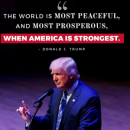President-elect Trump and the Middle East? | Moshe Dayan Center for Middle Eastern and African Studies

In the immediate aftermath of Donald J. Trump’s victory in the U.S. presidential election, Abdulkhaleq Abdullah, the Emirati chairman of the Arab Council for Social Sciences, wrote that the last thing the world needed was a “huge dose of uncertainty” that would only add confusion to the already muddled state of global politics.[1] Joyce Karam, the Washington Bureau chief for al-Hayat, pointed out that “unpredictability” and “lack of coherent foreign policy” define Trump’s approach to the Middle East.[2] Nevertheless, it is still too early to be definitive about how Trump will leave his mark on U.S. policy in the Middle East. Politics are reactive, and Trump will undoubtedly be confronted with new circumstances that will present unforeseen constraints and opportunities. Indeed, one of the principal critiques of President Obama’s Middle East policy has been its apparent lack of coherence, with many arguing that Obama intentionally eschewed a grand unifying principle. Ironically, then, Trump’s approach may ultimately demonstrate as much continuity as change in the Middle East, illustrating, that „far from being captain of the team, a president is often captive of his team and the world as he finds it.“[3] In other wor




Hinterlasse eine Antwort
Sie müssen... (sein)angemeldet sein um einen Kommentar zu schreiben.